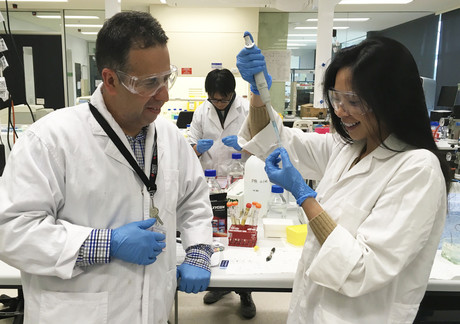RMIT research points to treatment breakthrough for viruses

An international collaboration headed by RMIT University researchers has discovered a novel new way of treating viral diseases including HIV, dengue, rhinovirus and influenza, the last of which infects five million people annually with a death rate as high as 10%.
The researchers identified a protein, Nox2 oxidase, that is activated by viruses in a biological process that dates back 1.5 billion years, affecting plants and fungi as well as mammals. This protein suppresses natural antiviral reactions, allowing the virus to take stronger hold in the host body.
Located in a cell compartment called endosomes, the researchers designed a prototype drug using a carefully modified chemical that inhibits the activity of the Nox2 oxidase protein. This customised drug has been highly effective at suppressing influenza infection in the laboratory.
RMIT senior author Dr Stavros Selemidis, an ARC Future Fellow, said: “Current treatment strategies are limited, as they specifically target circulating viruses and have either unknown or very little effect against new viruses that enter the human population. We have identified a protein of the immune system that contributes to the disease caused by flu viruses irrespective of their strain.”
More than 13,000 Australians are hospitalised due to severe influenza infections each year, resulting in over 3000 deaths.
First author Dr Eunice To said: “This work identifies a treatment strategy that has the potential to alleviate the symptoms caused by some of the most devastating viruses worldwide, including the flu.”
Having attracted considerable attention at the NADPH Oxidase GORDON conference in the USA last year, Professor Calum Drummond, RMIT Deputy Vice-Chancellor Research and Innovation, believes the research holds immense promise. “Dr Selemidis’ laboratory and his collaborators are pursuing further research to aid development of novel drugs for further trials and this is showing great potential,” he said.
Dr Selemidis, who is head of the Oxidant and Inflammation Biology Group within the Chronic Infectious and Inflammatory Diseases program at RMIT, said: “The strength of this work is the multidisciplinary approach taken and the degree of collaboration. It includes researchers and clinicians from eight universities across Australia, the United States and Ireland.”
Research collaborators include Professor John O’Leary from Trinity College Dublin, Professor Christopher Porter of Monash University and Professor Doug Brooks from the University of South Australia.
Published in Nature Communications, this research was funded by the Australian Research Council and the National Health and Medical Research Council of Australia.
A scientist, a cooler and a long-haul flight in the fight against MND
Early in January 2026, neuroscientist Dr Rachael Dunlop boarded a flight from Sydney to the US...
Mini lung organoids could help test new treatments
Scientists have developed a simple method for automated the manufacturing of lung organoids...
Clogged 'drains' in the brain an early sign of Alzheimer’s
'Drains' in the brain, responsible for clearing toxic waste in the organ, tend to get...



